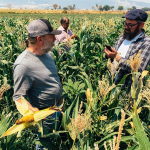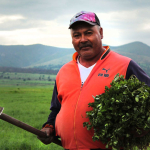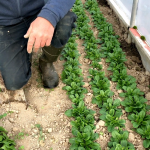Kenta Farm: for the Love of Weeds
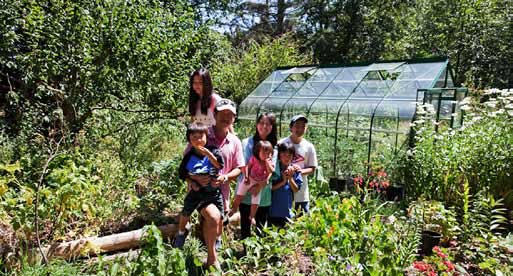
Hannah Roessler
The No-Weed Philosophy of Pender Island’s Kikuchi Family
Boarding the ferry early one summer morning en route to a unique family farm on Pender Island, I am reminded how lucky we are to live in beautiful, diverse British Columbia. I am on my way to meet Arthur Kikuchi, to see if the rumors are true – a farmer who doesn’t weed.I meet up with Arthur at the Pender Island school garden rather than his farm because it is Sunday, which means soccer day for the kids. When I arrive, kids are dancing around the schoolyard with a soccer ball while their parents are gathered next to the garden plot in the shade.
A cob-building workshop is underway, keeping these parents and other community volunteers hard at work. Soon the kids jump in to help do what they do best: play in the mud. Cob walls rise rapidly from the ground, forming a combined garden shed, teaching space, and gathering space with a cob bench and oven included.
“Soon we will cook the veggies from the garden in the oven,” says Arthur with a smile. “It is all so that we can teach the children.”
Farming, connecting with the plants and the earth, was the path to a better life for him and his family.
It is evident that growing food is Arthur’s second love: his first is sharing his knowledge and skills with children and youth. One of the first things he says to me, as I greet him and his eldest son, is that he feels it is very important to teach the next generation about growing food because “they are the future. My generation is past. This learning is very important.”
Farming as Healing
Arthur and his wife Sanae (whose name means “newly germinated sprout of a grain of rice”) don’t come from an agricultural background. “Not at all!” laughs Sanae. Their journey towards growing food started when Arthur was living in Paris as a spiritual healer, working with energetic medicine in the Shumei tradition. Unfortunately, he fell ill and was forced to return to Japan to seek healing himself. But no doctors were able to cure him, or even identify what was ailing him.
While Arthur and his healers searched for answers, he began working on a farm on Kishima Island, located in the south-western part of Japan. Within a month he began to see signs of his health returning. This was when he realized that farming, connecting with the plants and the earth, was the path to a better life for him and his family.
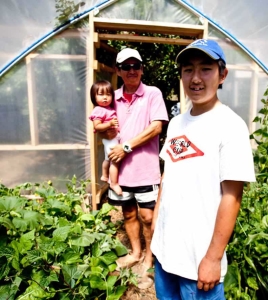
A Natural Farming Philosophy
Eventually, Arthur and his family came to Pender Island, where they quickly fell in love with the hills and trees that reminded them strongly of Japan. Arthur also felt a connection to the landscape where fellow Japanese farmers had previously farmed, and this tie to the past inspired Arthur and Sanae to settle and farm on Pender Island, bringing with them their unique brand of Natural Farming techniques. In 2000, they founded Kenta Farm on the island.
Arthur bases his practice of Natural Farming on the techniques prescribed by Masanobu Fukuoka, a famed Japanese agriculturalist and the author of “The One-Straw Revolution,” as well as the philosophy of Shumei. The basic tenet of this philosophy of farming involves modeling the agricultural system after natural systems.
An example is modeling the garden after the forest, allowing for a canopy layer, shrub layer, herbaceous layer, etc. This might mean leaving the weeds to grow. Yes. Leaving the weeds. To grow.
Weedy Pioneers
Arthur laughed as I asked him, several times, about his philosophy on weeds. Dealing with my own “weed explosion” on the farm is like dealing with a niggling, guilty conscience. Bunches of weeds about to go to seed stand upright in my field, proudly displaying their amazing ability to grow taller (overnight?!) than my crops.
“The weeds are just like the pioneer species in a forest ecosystem,” says Arthur, explaining, “I let them be. I just cut them down with my kana (a Japanese garden tool similar to a sickle), and leave their root structure intact. I believe that this helps maintain the soil structure, and overall, helps my garden grow.”
The weeds are just like the pioneer species in a forest ecosystem,” says Arthur, explaining, “I let them be.”
If weeds interfere too aggressively with a specific crop, Arthur will pull them, but mostly he lets the whole system of plants thrive, believing that nature knows best when understanding the role of each element of the system.
On This Farm, Everything Comes Full Circle
In keeping with this holistic approach, Arthur also doesn’t reach for outside inputs. He gathers a thin layer of soil from the forest floor to build his raised beds, as he finds this to be the best soil for growing. When I ask about potential issues with acidity, as forest soils in this region are known for their acidic qualities, he nods and agrees, but then gestures graciously to his garden beds where all sorts of crops are flourishing.
Lettuces, brassicas, chard, curcubits and corn all grow in a happy jumble, a testimony to the success of Arthur’s practice of intercropping. While he groups crops roughly by plant family, if a volunteer kale pops up in the lettuce patch, he will leave it to thrive.
His children have adopted this mixed method of growing and they’re clearly very knowledgeable about plants, though I have to pry it out of them because of their generous humility. Arthur’s children lead their school’s garden club, where groups of children from the school and around the island meet regularly to learn about seeds and work in the garden, learning and having fun all the while.
Standing in the shade next to the thriving school garden his children have created and the brand new cob gathering space he is helping to build, I’m impressed by the family’s commitment to growing community. With a family so passionate about sharing their knowledge and holistic vision, Pender Island is lucky to have the Kikuchi family.
Hannah Roessler has farmed in Nicaragua, Washington, and BC on permaculture famers, polyculture cafetals, organic market farms and a biodynamic vineyard. She has an MA in Environmental Studies, and her research is focused on climate change and small-scale organic farming. She currently farms on the Saanich Peninsula on Vancouver Island.


